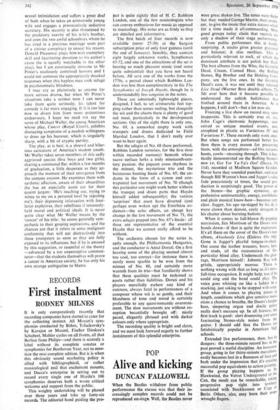POP
Alive and kicking
DUNCAN FALLOWELL
When the Beatles withdrew from public performance the excuse was that their in- creasingly complex records could not be reproduced on-stage. Well, the Beatles never were great shakes live. The tunes were theirs but they needed George Martin, their produ. cer, to give the music that extra stature which for a time made it all-commanding. Most good groups today claim that records are only a shadow of their stage performance. From public performers this is hardly surprising. A studio gives greater precision and balance; it also sterilises. This is particularly relevant to rock, of which the dominant attribute is not polish but flash. The best albums from the Who, the Grateful Dead, Cream, Canned Heat, the Rolling Stones, Big Brother and the Holding Com- pany. are the live ones. In the Grateful Dead's case, it was not until they released Live Dead (Warner Bros double album, 72s 5d) over here that it became possible to understand the cultish hullabaloo that frothed around them in America. As it happens, I still don't—but a lot now do.
Freezing a live show on record may seem inapposite. This is certainly true of, say, John Cage's electronic happenings, con- ceived as unique musical events, now atrophied in plastic as Variations 1V and Variations V. These records only work once. But when songs are performed better live then there is every reason for preserving them, with the atmosphere—ad libs, screams, hoots, yowls—steaming through. This is hec- tically demonstrated on the Rolling Stones's new LP, Get Yer Ya-Ya's Out! (Decca, 39s 11d), recorded at Madison Square Garden. Never have they sounded punchier, and even though Bill Wyman's bass and Jagger's voice fade precariously at times, the sound pro- duction is surprisingly good. The power of the Stones—the graphic cynicism, ap- prehensive sentimentality, energy, confidence and plain musical know-how—becomes very clear. Jagger, his ego up-staged by his id, is more clown than demon, coyly arrogant in his chatter about bursting buttons.
When it comes to full-blown fly-popping narcissism, Jim Morrison of the Doors wins hands down—if that is quite the expression. It's all there on the cover of the Doors's new album, Absolutely Live (Elektra 69s 10d1. Gone is Jagger's playful tongue-in-cheek. Out come the leather trousers, boots, belts and studs, all the razzamatazz of this particular blind alley. Underneath the glad- rags, Morrison himself: Johnnie Ray with gristle, appropriately morose. There is nothing wrong with that as long as ifs not a full-time occupation. It might help, too, if he could sing and the band could play. The voice goes whining on like a ladder in a stocking, just asking to be stopped with soap. And when it comes to playing pieces at length, conditions which give sensitive musi- cians a chance to breathe, the Doors's leaden bass, simpering organ and docile guitar really don't measure up. In all fairness, the first track is good : alert drumming and some fascinating Stones-style noises from the guitar. I should add that the Doors are fetishistically popular in American high schools.
Extended live performance, then, has its dangers: the three-minute record has M the past proved a useful discipline. An immature group, going in for thirty-minute marathons, easily becomes lost in a flummox of fuzz and bash under the impression that it's creating successful pop equivalents to action painting. If the group playing happens to be Hawkwind, the Velvet Underground or the Can, the result can be remarkable, taking progressive pop right into territory associated with Stockhausen or Cage or Berio. Others, alas, may burn their over' wrought fingers.


































 Previous page
Previous page